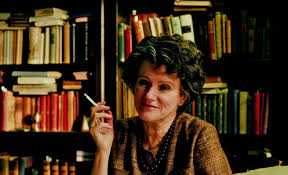Hannah Arendt (2012)

This week Classic Couple Academy watched 2012 German-Luxembourgish-French biographical drama film Hannah Arendt. Directed by Margarethe von Trotta, the film centers on the life of German-Jewish philosopher and political theorist Hannah Arendt, beginning when in 1961 she covers the trial of Nazi Adolf Eichmann for The New Yorker magazine. Arendt’s writing on the trial, the final form of which was 1963 book titled Eichmann in Jerusalem, depicted a controversial view of both Eichmann and the Jewish councils and introduced her famous concept of “the banality of evil.” With its focus on the experiences of a central character, Hannah Arendt is a fitting study film for Women Make Film: A New Road Movie Through Cinema chapter 26 content on melodrama.
Thoughts on this week’s Academy Assignment below.
What storyline cemented the film as a melodrama?
As a biographical film, Hannah Arendt focuses on the life of the famous political thinker as she takes on an assignment that forever changes the course of her life. Arendt’s coverage of the 1961 trial in Jerusalem of Nazi Adolph Eichmann included a depiction of Eichmann not as fanatic or sociopath, but an average order-taker. This characterization, along with a perception that she “blamed the victim” in her discussion of Jewish leaders, caused her to be ostracized by the Jewish community, the nation of Israel, many academic colleagues, and several of her lifelong friends.
The film uses this seminal project in Arendt’s life to depict who she was as a woman. Viewers experience Arendt’s most vital relationships by witnessing her going about her life: working with her personal secretary, dining with her husband at home, entertaining friends in a lively intellectual salon, instructing students at university, traveling to Jerusalem to cover the trial and staying with friends, and escaping to a holiday home for solitude. In all of these settings Arendt the woman is revealed.
Bonus: How did the Women Make Film melodrama, sci fi and hell and horror chapter material influence how you watched this film?
The film centers on a time in Hannah Arendt’s life where she truly has it all. In 1961, she’s a famous political theorist, honored author, respected professor, beloved friend and cherished wife. Her decision to cover the Adolph Eichmann trial and her subsequent theories and publications forever change her professional and personal relationships. Arendt’s reflections on her decisions, across her life, take the viewer on an emotional journey of discovery. Melodrama at its best.
